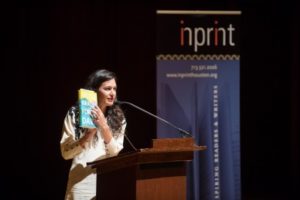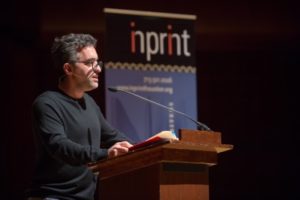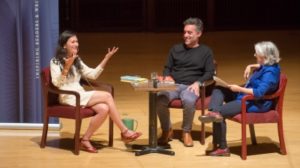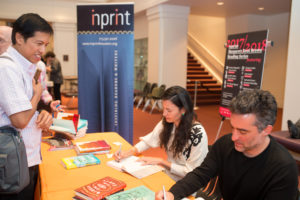Nicole Krauss & Nathan Englander call attention to the radical resilience of cities in post Harvey Houston reading
September 25, 2017, by Charlotte Wyatt
 Last Monday’s sudden storms brought uncomfortable reminders of the recent devastation in and around Houston, echoed now in Puerto Rico, and Florida, and other parts of the Caribbean and the Gulf. Those of us who made it to this season’s first installment of the Inprint Margarett Root Brown Reading Series were soggy and a little anxious to come in from the rain. We crowded the orchestra section of Rice University’s Stude Concert Hall, borrowed in the wake of Harvey’s damage to the Wortham Center’s performance spaces.
Last Monday’s sudden storms brought uncomfortable reminders of the recent devastation in and around Houston, echoed now in Puerto Rico, and Florida, and other parts of the Caribbean and the Gulf. Those of us who made it to this season’s first installment of the Inprint Margarett Root Brown Reading Series were soggy and a little anxious to come in from the rain. We crowded the orchestra section of Rice University’s Stude Concert Hall, borrowed in the wake of Harvey’s damage to the Wortham Center’s performance spaces.
But rather than distract us, both Nicole Krauss and Nathan Englander called attention to the radical resilience of cities, and how storytelling can serve that resilience. Their readings addressed the dedication and distress so many of us have recently witnessed and felt.
The excerpts Krauss chose from her new novel Forest Dark explored the threshold of self-knowledge and knowledge of others, and of how we probe and expand the rifts in our personal realities. She spoke of the ways in which writing can invent identity, that writing is often an act of self-invention instead of self-expression: “Each time you tell another story,” she said, “you amplify what it is to be yourself.”
 Englander’s Dinner at the Center of the Earth offered a platform for his own stories of a city in turmoil. He shared alternately hilarious and wrenching images from the period of his life spent in Israel, which provide the book’s foundations and themes. The effect seemed almost like an illustration of what Krauss had just discussed, but the two authors and their work were in such deep dialogue, the same effect would have been achieved no matter who read first.
Englander’s Dinner at the Center of the Earth offered a platform for his own stories of a city in turmoil. He shared alternately hilarious and wrenching images from the period of his life spent in Israel, which provide the book’s foundations and themes. The effect seemed almost like an illustration of what Krauss had just discussed, but the two authors and their work were in such deep dialogue, the same effect would have been achieved no matter who read first.
 Memoirist and fiction writer Leah Lax interviewed the authors, both long-time friends who attended graduate school together. Englander joked he would participate by listening to Krauss and periodically concurring, but Lax offered incisive questions that allowed the two to build on one another’s insights. They discussed their shared desert settings, the problem of research for fiction, and the ways in which in their respective writing processes have shaped their careers. Krauss also discussed the decision in this novel to name her protagonist after herself, a risky choice but one which speaks to her thematic and personal interests in changing the reality of roles or circumstances. Englander concurred, but on his own terms—that each book he has written leaves him more vulnerable, as he grapples with questions like a long-held “obsession” over justice and injustice. They both reminded, by example, the importance of delving into the joy and sorrow of the “complete world,” as Englander put it, “which has all things in it.”
Memoirist and fiction writer Leah Lax interviewed the authors, both long-time friends who attended graduate school together. Englander joked he would participate by listening to Krauss and periodically concurring, but Lax offered incisive questions that allowed the two to build on one another’s insights. They discussed their shared desert settings, the problem of research for fiction, and the ways in which in their respective writing processes have shaped their careers. Krauss also discussed the decision in this novel to name her protagonist after herself, a risky choice but one which speaks to her thematic and personal interests in changing the reality of roles or circumstances. Englander concurred, but on his own terms—that each book he has written leaves him more vulnerable, as he grapples with questions like a long-held “obsession” over justice and injustice. They both reminded, by example, the importance of delving into the joy and sorrow of the “complete world,” as Englander put it, “which has all things in it.”
 Keep an eye on the archive for the full video of their readings and interview coming soon to the online Inprint Archive of Readings and join us in November with authors Jennifer Egan, Claire Messud, and Viet Thanh Nguyen!
Keep an eye on the archive for the full video of their readings and interview coming soon to the online Inprint Archive of Readings and join us in November with authors Jennifer Egan, Claire Messud, and Viet Thanh Nguyen!

